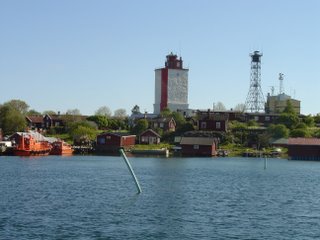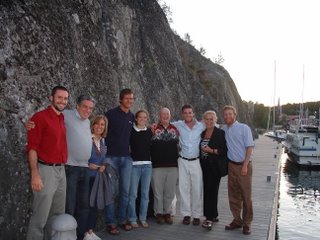June 18, 2006
Ships Log
June 18, 2006
Departure Location: Utö, Finland
Departure Time: 7:15 hours
Distance Traveled. 62.82 Nautical Miles
Arrival Location: Hangö, Finland
Arrival Time: 21:30 hours
Weather: Sunny, SE wind – moderate in the morning becoming brisk in the afternoon
Personal Comments
Happy birthday Caleb! To punctuate this momentous occasion Cap’n Jonas was relieved from his on deck duties and reassigned to the galley. Several rounds of Swedish pancakes were prepared, topped with jam\fruit\honey, and served right out of the pan.
For all you folks at home with metric measuring cups, the recipe is as follows:
5 decilitres flour
4 eggs
1 litre milk
Mix ingredients together. Lightly grease pan to prevent sticking. Spoon enough batter into frying pan to thinly coat. Cook on medium heat until edges start to curl upwards and batter has stopped moving on the surface. Flip and brown on other side for roughly 30 seconds. When finished, pancake should be similar to a crepe. Spread with topping of choice and then roll. Enjoy.
Today we sailed for fourteen hours. This feat alone sounds daunting, but it is further complicated by the fact that most of our day was spent sailing into the wind. Because of this, our average speed hovered around four knots and made on-deck conditions cold and windy. A certain edginess could be felt among the crew due to the confined space and long, cold, and monotonous conditions. Our efforts were not in vain, as we have now reached the Finnish mainland and will set off for Troy tomorrow via land.
Dinner was served upon arrival and several rounds of champagne were toasted to celebrate Caleb’s birthday and an epic day of sailing.
Research Comments:
Today there was much discussion among the group about what it must have been like to sail these distances in uncertain conditions and in much less able boats. Although Stockholm has been experiencing record highs since our arrival (often upwards of 90 degrees Fahrenheit), being on the water has made our experience a much colder one. Because of the wind and temperature we typically wear sweaters and jackets while on deck and long sleeves down below. In the time of the Homeric epics, the weather would have been slightly warmer, but the discrepancy in temperature would have been similar, and the distances and mental fatigue associated with long days of sailing would have added to their discomfort. Achaean square sailed ships would not have been able to sail as close to the wind as our modern vessel, meaning that the Achaeans would have been unable to cover the distances we have, given these same wind conditions. Many times our travels take us through islands and straights that make it necessary to draw in the sails and switch to motor power. Unlike today’s modern travellers, the Achaen sailors would not have been fortunate enough to have this luxury and would have relied on rowing or been forced to wait for the appropriate winds to carry them through these channels. Many of Vinci’s arguments for the way that weather might have affected the travels of the Achaens can be found on pages 185 to 190 in a section entitled “Evidence of Climatic Decline.” This includes the difficulty (mentioned in earlier posts) that the Acheans encountered when gathered at Aulis, requiring the sacrifice of Agamemnon‘s daughter. Also mentioned is the difficulty that they encountered on their return from Troy due to storm winds.
One of the arguments that Vinci makes regarding the sailing conditions described in both the Iliad and the Odyssey is that they correspond better with a northern climate than with the conditions found in the Mediterranean. Passages containing sleet and snow are not uncommon, as well as descriptions of fog and the “wine dark sea” (Book 7, line 88) which better reflect the Baltic than the Mediterranean. Pages 184 to 191 in Vinci’s text contain many of the references to weather conditions in the Iliad and Odyssey. These conditions would have been worsening during the period of the climatic downturn, and would have increased the need for resources leading to greater warring over resources that were previously undisputed (pg 190-191).
In talking with long time residents in our various ports of call we have learned that the weather here can change quickly and dramatically. Some have said that it is not uncommon to have snow in early June, and Jonas has routinely commented on how rare it is to have a trip this time of year with so little fog and rain. Although these comments are all anecdotal, they are in line with Vinci’s arguments and are worth keeping in mind over the duration of our travels.

The Island of Uto


0 Comments:
Post a Comment
<< Home